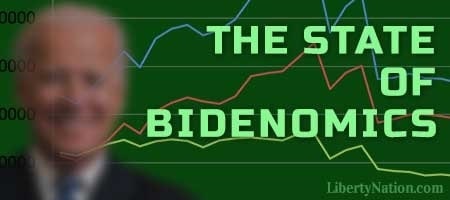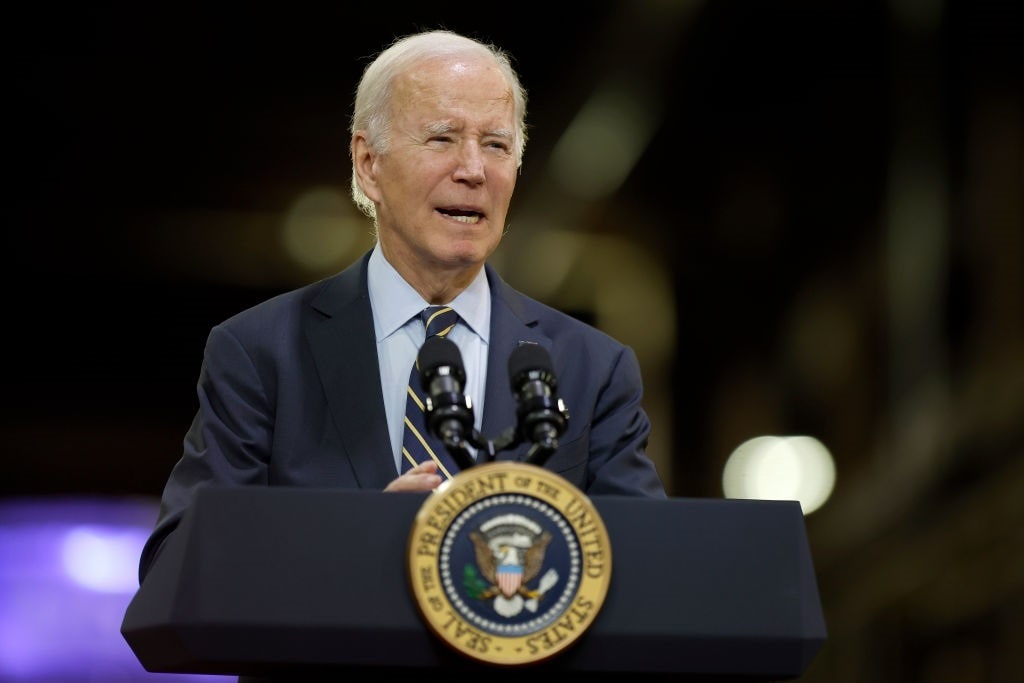President Joe Biden, administration officials, and prominent mainstream media figures say it is the Fourth Estate’s fault Bidenomics is not catching on with the American people. It is the old Chico Marx joke, “Who are you going to believe? Me or your own eyes?” Rather than concede that the public genuinely thinks the economy is in rough shape because of their challenges, the left is pulling out more excuses than Hillary Clinton did in 2016. But is it the media’s fault that voters are giving the thumbs down, or is the economy in a flawed position?
Skeptical on Bidenomics
Since President Biden and the White House welcomed the term “Bidenomics,” the administration has been championing these policies, proclaiming that the incumbent’s economic doctrine is working. As Biden touts victories, he accused journalists of being too gloomy in their reporting, presenting a false portrait of the economic landscape.
One can only imagine if former President Donald Trump uttered these words. The alphabet networks would be apoplectic and shriek to the heavens that he is threatening a free and fair press and represents a danger to democracy.
 The president isn’t the only one scapegoating reporters, anchors, and writers for the public’s belief that the nation is headed in the wrong direction. John Harwood, a former CNN and NBC personality, posted on X that his colleagues “need to better convey” that “the economy is doing well, not poorly” and “Biden at 80 is handling the job effectively right now.” Keynesian economist Paul Krugman has asserted in his blog for more than a year that the media has become “especially vitriolic” and that it is falling short of accurately covering the gains manufactured by Bidenomics. Of course, this is the same person who declared the war on inflation to be over because if you remove food, gasoline, shelter, and used automobiles from the equation, there is no inflation.
The president isn’t the only one scapegoating reporters, anchors, and writers for the public’s belief that the nation is headed in the wrong direction. John Harwood, a former CNN and NBC personality, posted on X that his colleagues “need to better convey” that “the economy is doing well, not poorly” and “Biden at 80 is handling the job effectively right now.” Keynesian economist Paul Krugman has asserted in his blog for more than a year that the media has become “especially vitriolic” and that it is falling short of accurately covering the gains manufactured by Bidenomics. Of course, this is the same person who declared the war on inflation to be over because if you remove food, gasoline, shelter, and used automobiles from the equation, there is no inflation.
Is this even accurate? Big-box media seem to espouse these views comparable to The Simpsons character Seymour Skinner: “Am I out of touch? No. It’s the children who are wrong.” Instead, everyone residing in The Swamp mutters, is the economy that bad? No. It’s the families who are wrong.
Here are just a few headlines over the last several months:
- Wall Street Journal: “The Economy Is Great. Why Do Americans Blame Biden?”
- Bloomberg: “Anger Is What’s Driving the US Economy.”
- The Guardian: “US Economy Going Strong Under Biden – Americans Don’t Believe It.”
- New York Magazine: “3 Reasons Biden’s Strong Economy Is Unpopular.”
- Salon: “Joe Biden’s economy is, honestly, pretty amazing.”
Liberty Nation has reported extensively on what is happening underneath the hood of the US economy, from GDP to jobs. But it is vital to identify what the American people witness on the ground daily.
Strolling Down Main Street
The University of Michigan’s Consumer Sentiment Index plummeted to a six-month low in November amid the adverse effects of inflation, higher interest rates, and the wars in Israel and Ukraine. The Consumer Expectations Index and Current Conditions Index also slumped this month. One- and five-year-ahead inflation expectations rose to 4.4% and 3.2%, respectively.
Many folks think their pecuniary position will deteriorate over the next year. According to the Federal Reserve Bank of New York’s Survey of Consumer Expectations, about one-third of US households say their financial situations will be worse off one year from now. Additionally, 41% report that their financial conditions are worse than a year ago.
Last month, The Conference Board’s Consumer Confidence Index tumbled for the third consecutive month as respondents “continued to be preoccupied with rising prices in general, and for grocery and gasoline prices in particular.”
Some will shrug off these reports, contending that the human condition is tragic. It is an evolutionary mechanism, a survival instinct to be negative more than positive. Psychologists aver that mankind suffers from positive-negative asymmetry, a cynical bias that forces us to feel more pessimism than positivity. While scientists can debate the merits of these theories, the economic data suggest that adults’ negativity might be justified.
Credit card debt is north of $1 trillion. Auto loan delinquencies among subprime borrowers are at the highest rates since 1994. Monthly mortgage payments are 52% higher than before the coronavirus pandemic. The public’s purchasing power has been eroded by 10% since the beginning of the public health crisis, while cumulative inflation has surged about 17% since 2021. The number of people working two or more jobs is at a record high. Half the country is living paycheck to paycheck.
Reality Bites for Politicians
Indeed, these are fundamental trends occurring throughout the US economy, contrary to the claims that Bidenomics is working for the bottom-up and middle-out. Be it sentiment observations or hard data, it is better to believe what the average man or woman conveys to policymakers, not the millionaires with agendas perched on their ivory towers who do not endure the same challenges as everyone else. As legendary economist Thomas Sowell wrote, “Evidence is too dangerous – politically, financially and psychologically – for some people to allow it to become a threat to their interests or to their own sense of themselves.”




